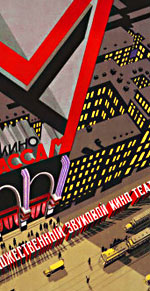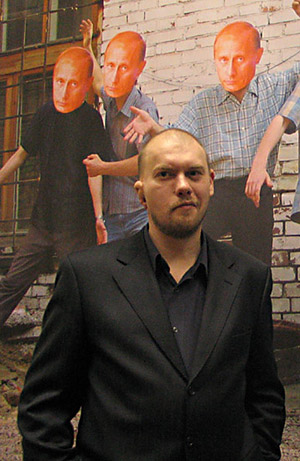
| Jacket 36 — Late 2008 | Jacket 36 Contents page | Jacket Homepage | Search Jacket |
This piece is about 7 printed pages long. It is copyright © Andrei Rodionov and Matvei Yankelevich and Jacket magazine 2008. See our [»»] Copyright notice. The Internet address of this page is http://jacketmagazine.com/36/rus-rodionov-trb-yankelevich.shtml

Back to the Russian poetry Contents list
Five poems:
[“Теперь, когда нежность над городом так ощутима...”]
[“Люди безнадёжно устаревших профессий...”]
[“Ты слышишь молчание...”]
[“Я шел по мосту через огромную Волгу...”]
[“как ведущий литературных шоу, конкурсов...”]
***
[“Теперь, когда нежность над городом так ощутима...”]
Now, when the tenderness is palpable above the city,
when kindness sings in your ear, barely audible,
now, when the blast of that tenderness booms,
like Hiroshima, my trusting city absorbs it all.
How tender the asphalt, like a napkin, how this home,
most tender, paneled, pastel and cold, touches the heart,
just a little warmer than the previous house, the gray one,
and this one is a little pink, tenderness behind each window.
In slightly worn heels, spectacular tenderness enters,
and softly, barely touching your head, caresses
you and you with a dose of its snowy medicine,
we’d never known Moscow to be so kind and so tender.
Now the kindest of birds fly softly among us,
waving to us like dead soft hands, forgiving us
for every little thing, and these dim lights — the capital’s
upper-most tenderness — shine blandly for us.
And suddenly this mumbled word — “degenerates.”
You hear it and tenderly think: “What was that?”
Some nasties aren’t happy to see us in the city,
but how can they dislike us, and, really, for what?
It’s likely that machine that counts out your rides
sees a zero on your crumpled card. Likely, that quiet man
doesn’t care for us — his fingers shine from the barrel,
his badgered gaze glazes over with the vodka he’s drunk.
Oh, all this hatred from vodka, from drinking vodka!
From the vodka and the drunks and the girls greedy for cash!
Oh, the bubbling of tenderness in these silhouettes
in the darkness, of birds or amputated hands.
We are the soldiers of this nighttime Moscow tenderness,
we breath the exalted smoke and mint fire.
And sometimes he also calls us “degenerates” —
still we remember him with tenderness — the sad passerby.
* * *
[“Люди безнадёжно устаревших профессий...”]
People of hopelessly antiquated professions
joyfully raise their eyes, so recently full of tears.
Down Tverskoy goes the procession to end all processions,
the poets who are taken seriously.
The poets walk into bars and banks,
into the shoe store and bookstore, and everywhere
in exchange for their sonnets, free verse and tankas
they are offered drinks, grub, clothing, and footwear.
All the people are happy — only the gays feel wronged:
why are they allowed a parade, and we’re not?
They’re allowed, because they are saying farewell,
today they’ll be going and never coming back.
The people gather gaily at our Golgotha:
here the most serious wordsmith will intone,
and the ventri-loin-quist, one of the locals,
will sing back-up for him with her loins:
“We filled all the cracks, all the lacunae,
we smoothed out all the corners and glitches,
we destroyed everything that can be strung
and everywhere you can score a goal.”
Every year we bid them farewell, you won’t hear a word
before autumn, then little by little they fill up Moscow,
but this time we’ll place surveillance towers along the belt road —
the mayor promises every time, but it’s empty talk.
While spiritually rich parents still have their children,
while the rich aren’t forbidden to multiply,
these dickheads will have their audience,
and that means the dark day is nigh.
Some dance, others sing, others play the fool,
“That’s no effin’ poetry at all,” still others huff,
yet down Tverskoy they walk, selling their poems
for various useless and useful stuff.
* * *
[“Ты слышишь молчание...”]
Do you hear the silence?
That’s the provincial fish
swimming in the waters below
flapping their fins
Good thing you can’t
hear their banter
and from above it’s quaint —
they swim and keep silent
A lot like the way this immense country whispers
swimming by on the TV screen
you speak to me in the voice of an anchorman
to the rhythm of an underwater dream
Auntie Manya’s homeland
in a voice that’s slightly sarcastic,
warning me: there, deep down
is our real Homeland
the ear bends with the weight of the grain
and they sing songs, but you can’t hear it,
it’s too far away
Soundless provincial fish
open their mouths that resemble zeroes
and we might be able to hear it
but so far we can’t for some reason
and we don’t have a clue what they’re saying
down there, only sometimes our hooks
snatch up some little goby
or a marginal prickly bullhead
even when he’s flopping around on the line
and opens his mouth
you still can’t hear what he’s singing
as you take the hook out
so that’s the way the water world works
it’ll be like that till we die, maybe forever
and now, when there’s air between us,
all the same, it’s still water, water
* * *
[“Я шел по мосту через огромную Волгу...”]
I was walking the bridge over the huge Volga,
where the fisherman was already fishing,
the river was cooling down and the steam was
rising — as if wolves were breathing.
I wasn’t sure — is it ice under me,
clear and thin like a razor. I couldn’t
check to see — were the shaggy whirls
carried under the ice by the river’s current?
The bridge shuddered, with the movement of trams
the railings quaked, and I quaked with them,
but why was I quaking — it was not gods
that drove these pylons into the depths, but men
Reddish and grayish, the water passed
under that bridge, a bit black, a little white
Oh, Volga, why do you seem like a chasm,
a leaden nightmare, a dream of death
Where the island lay shackled, half-flooded,
where bare branches stuck out of the ice,
where the wordless wind, sharp as a blade,
cleaved me in two, it was then that I
saw the yellow church on the break water
as I turned, and the kremlin’s turrets, the damp
whitewashed firmament of the sky
with the glow of a low-wattage lamp.
Like the panes of a hospital, the whitish waves
gathered and swirled. I felt the tempting call
of that bleak element, the terrible Volga
rolling heavily underneath like a icy ball.
I strode the bridge quietly, without purpose
and suddenly I smiled and saw a two-story quarter
of ham-colored brick in the distance
and ships frozen solid into the pier,
snowdrifts, birches and pine trees, too,
the color-dots of people... Just a minute,
ham-colored, brick houses, wait a little,
here i will learn how to love you.
* * *
[как ведущий литературных шоу, конкурсов,]
when the host of several literary shows and competitions
and curator of various literary programs
woke up in the middle of the night — so ended
the pound of his peace and happiness
it appeared to him in his dream, the best of all shows,
the one he must prepare and conduct
in order to shake up the whole literary scene:
“The Best Poet of Russia!”
that’s what it must be called
we’ll go on air live and seek out
the best poet through a chain of flats
even if he’s fallen into a drinking bout
of course it’s a drunks calling to find the one
that’s the best poet in all the Russian lands
in the kitchens, where the lamps burn mono
like the light of a complex taxi-cab
in the first they thought Lev Losev was #1
and the flat owner pulled a few
tender strands from his (not Losev’s) chin
for asking the innocent question “Why?”
he hung out where they moaned “Voznesensky...”
while a plastic chair squeaked beneath,
he swayed and bent like a Viennese chair
in another apartment, with Catullus and Poe on the shelf
when, after Kushner was mentioned with wringing of hands
by a cheapskate in a kitchen the size of a school’s gymnasium,
in a dirty hole he heard the last name of Vitukhnovskaya
he knew that he’d soon be reaching the final stage
then the names rained down as if from the horn of plenty
he stopped writing them down, stopped estimating their chances —
Akhmadulina, Stepanova, Nikolaeva with her bible —
he barely chuckled when someone mentioned Elena Shvarts
he drank whole nights with the bums, outcasts,
they suggested he read Evtushenko
but there was nothing left of that man, the host
of “Best Poet of Russia”, he was himself no longer
between the thirteenth and the fourteenth night of alcoholization,
at night, when all were asleep, quivering, he awoke
and saw before him — the best poet of the Russian nation
and he started waving away the poet as though he were a ghost
you wanted to see me? you called for me, fool?
so here I am, what, don’t you like it?
brainless curator of wretched literature,
I have appeared, and will never depart!
In the rain, with the final segment of cultural news on TV,
the rare drenched passerby may meet
a gloomy, quivering, hunchbacked figure
of a man whose face bears the stamp of insanity
who is it? maybe it’s the very best poet of Russia?
no, too wretched and unfortunate is his visage.
heed my advice, passerby, keep walking
the way you were going, you can’t change a thing.
Trans. Matvei Yankelevich
Translation(s) originally commissioned by CEC Artslink on the occasion of the author’s visit to the US as a participant in their Open World program.

Andrei Rodionov
Andrey Rodionov (b. 1971, Moscow) is one of Moscow’s most conspicuous poets. He dominated the Russian slam poetry scene in the early 2000’s, and now curates many of Moscow’s slams. He has four books of poetry, including Toys for the Outskirts (2007).